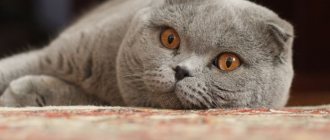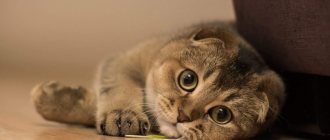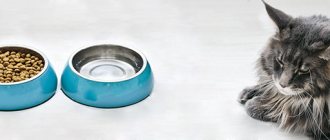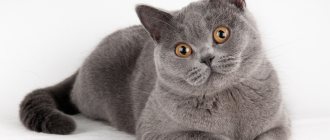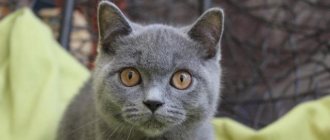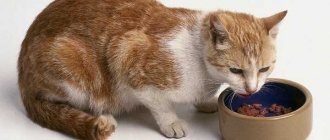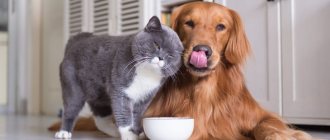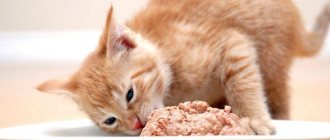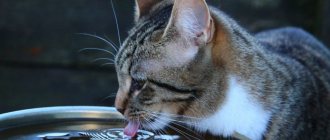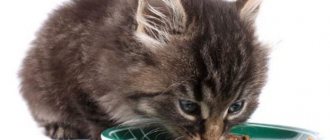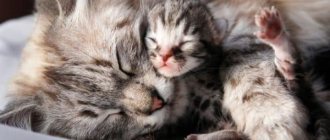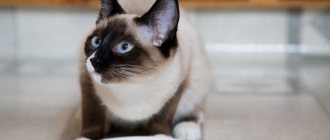Owners of British cats pay a lot of attention to the development, health, and condition of the animal's coat. For the general condition and external attractiveness of a Briton, it is important to use the right diet. An optimally selected consumption regimen and quality of products will give the pet a supply of energy, vigor and activity, and most importantly, extend longevity.
Proper diet
They adhere to proper nutrition from the first days of life, and especially after 3 months, when the kitten is separated from its mother’s milk. The baby leaves the nursery and goes to a new home. Changes in the composition and norm of nutrition, which will subsequently differ as the animal grows.
The diet and composition of the diet, menu for each period of life depends on the state of health and age of the cat. Food for mature British cats differs from food for young cats.
The diet is prepared taking into account individual preferences, new products are gradually introduced, and the pet’s reaction is observed. British food lovers who are prone to obesity are fed at least 2 times a day. Bottled water in a bowl, change it daily.
Mixed feeding
Breeders and felinologists do not recommend feeding the British cats both natural food and industrial food. This is fraught with problems with digestion and urination. In addition, it will be difficult for an inexperienced owner to balance the diet and calculate its calorie content.
Sometimes a British cat can still be given different types of food, but this needs to be done at different feedings. For example, offer your pet dry kibble in the morning and meat in the evening. But it is not recommended to practice this method constantly.
How to feed a British cat and cat
The diet consists of several types of food:
- natural food;
- dry food;
- wet food;
- mixed.
The owner, depending on the circumstances, chooses one specific type or a mixed one. Some stick to one type of diet all the time and don’t change it for a long time. But there are adherents of natural or mixed feeding.
When feeding natural products, complex vitamins and minerals are added to the diet, special cat grass is grown, or grains are sprouted.
When consuming good quality industrial feed, no additions are required. Catering is largely determined by the following factors.
- Age. Developing organisms of young animals need more vitamins and protein foods. For mature cats and female cats, low-calorie food and dry food are suitable.
- Floor. Cats are more powerful and active, they consume more food to build muscle mass.
- Health status. In case of allergies, obesity and pathologies of the body, special premium food is selected for sick pets, taking into account the problems and the recommendations of the veterinarian.
- Physiological state. A cat in a state of pregnancy, then lactation, needs a properly formulated diet. Food should contain proteins, fats, carbohydrates, taking into account the addition of complex vitamins and minerals.
- The accelerated pace of life often takes a lot of time, so the combination of wet and dry food with natural products is optimal.
General feeding rules for British dogs
Of course, British cats do not all eat the same thing. Each pet may have its own taste preferences. But the general feeding rules for animals of this breed must still be followed. So, what to feed a kitten and an adult British cat so that they are healthy and live without problems? And how to feed them? Because the number of meals per day and the total weight of what was eaten play an important role.
Rules for feeding British kittens:
- The daily food intake should not exceed 300 grams for adults (and ideally 200-250) and 150 grams for kittens.
- No feeding from the master's table! For the British, even if they are on a natural diet, they cook separately.
- Only fresh food - be it dry food, wet food or specially prepared natural food.
- If it is meat, then only frozen and then scalded.
- The fish is only boiled and only from the sea.
- Chicken eggs (boiled only) or quail eggs (in any form) are given to the animal no more than once a week.
- Milk - only babies and adult pets of the British breed are allowed only fermented milk products, and even then not often.
- Nothing smoked, canned or sweet.
- Use only premium dry food.
- Only fresh water in a convenient container should always be freely available to the animal.
What to feed a Briton
The modern rhythm of life, constant plans and problems create a lack of time. They do not allow you to fully comply with the British cat’s diet. Manufacturers of food, both dry and wet, came to the aid of British owners, taking into account the age, physiological and other problems of the British breed. Well-known companies have created several lines of premium food products. These include:
- The first in the food rating are Bosch, Innova Evo, Royal Canin;
- Iams Cat, Acana, Hill's, Iams Cat, Farmina are in constant demand;
Cute kittens of the British shorthair silver tabby breed from the German nursery Silver Treasure are named face. In 2003, the cat Simba was the first to pose for a company advertisement.
Don’t worry that it’s too difficult, because at home it’s very easy to create a delicious menu and feed British cats. The diet includes permitted foods and pampers your pet with his favorite dishes.
Dry food
Busy British owners prefer to feed their friend high-quality premium dry food. “Small lumps” of nutritious food, varied in diet, are selected according to taste, health, and age of the animal. Dry food is available for tiny kittens and for British adults. Leading manufacturers produce high quality feed products:
- “Earthborn Holistic” - its content contains protein (44%) from herring, chicken, turkey flour, some carbohydrates, it includes a large group of products: - eggs, rolled oats, rice, healthy flaxseed. The food contains a complex of vitamins and minerals. Calcium and phosphorus are involved in strengthening teeth and skeletal bones. Small food granules are suitable for kittens and adults.
- "Go!" — food, contains protein (32%) from chicken meat, carbohydrates from rice bran, brown rice, apples, alfalfa. Rolled oats and flaxseed oil are added to the food, which do not cause allergies. Taurine contained in the granules strengthens cardiac activity. A granule composition has been developed that is suitable for cats of all ages.
- “Bosch Sanabelle Grande” - contains protein (31%) from mussel meat to strengthen blood vessels, the percentage of protein is low. The food reduces the likelihood of developing urolithiasis. The granules contain yucca extract to reduce stool odor.
Wet food
Wet food has the same content as natural food, but is more convenient for quick feeding and is suitable for busy owners. The food is produced in compact packages, in bags or in cans, with dosage and contents corresponding to the diet. The advantage is that it can be stored in a sealed state for a long time. The downside is the high cost and it must be consumed immediately after opening.
Manufacturer name | Feed | range | Compound |
| PRO PLAN "PURINA" | kittens, adults, sterilized, health problems. | canned food in bags | Fish platter |
| Hill's Pet Nutrition | Medicinal feed | canned food in bags | Protein meat platter |
| Happy Cat, Germany | super premium. | canned food in bags | Meat and vegetable platter |
Vitamins in the diet
An important aspect is the presence of age-appropriate vitamins that promote the active growth of the kitten. The number of feedings (meals) up to six months should be six, by 10 months - four. Frequent feeding is due to the small size of the stomach of British kittens.
It is recommended to keep British cats over a year old on 2-3 meals a day of dry and wet food; show cats can consume approximately equal portions of food of these types. All others are in the proportions of 70% dry food, 30% wet food.
At home, the daily menu includes lean meat (turkey, rabbit, beef, chicken and the like), internal and less valuable parts of slaughtered animal carcasses, marine varieties of lean fish, oats and wheat sprouts (sprouted), herbs, egg yolks , porridge from semolina, rice, buckwheat, barley, wheat cereals.
Grass must be included in the cat's diet; it can be bought or grown from seeds. Giving begins at 7-8 months. Cats independently determine which part is the top or base of the stems. The purpose of the grass is to ensure that the animal does not leave the premises during its life,
It is important to note that in order to exclude pet diseases, it is strictly forbidden to include raw yolks, and even more so, whites in any form. Milk is completely out of use at the age of 6-8 months. Changes in diet should take place in accordance with the advice or opinion of a veterinarian and the age and health of the cat.
Feeding with natural products
Natural food products are considered more healthy in terms of protein and carbohydrate content with a high content of vitamins, fiber and microelements. It is not difficult to provide such a diet, but it is troublesome, expensive, and you will need to spend time purchasing a variety of products and preparing them. Owners who have enough free time prepare food from natural products for their pet.
The natural nutrition set includes: lean meat with by-products, fermented milk products, sea fish, cereals and vegetables with fruits. Each natural product is processed and prepared according to specific recipes, ensuring maximum preservation of the beneficial content and properties.
Meat
Meat is the basis of the British daily diet, accounting for about 2/3 of total consumption. It must be fresh. Meat products include beef, lean parts of chicken, turkey, and rabbit. To prevent helminth infection, meat products are frozen for 2 days in the refrigerator. The owner gives food to the cat raw, but it is better to pour boiling water over it or boil it. Before feeding, food is chopped into pieces, veins and bones are removed, especially tubular ones from game. It’s good to grind everything into minced meat, it’s convenient to make it in advance, then defrost it in portions. Beef, rabbit, and poultry by-products are added to the meat, which are also pre-treated with cold.
Fish
The British weekly diet contains lean ocean or sea fish, rich in phosphorus and amino acids, present at least 2 times. First, the fish is cleaned of scales and bones, the tail, head, and entrails are removed. The finished fillet is boiled for up to 10 minutes in boiling water, and cold pieces are fed to the pet. Fish choices include hake, cod, pollock, navaga, and blue whiting. River fish with small bones is given in ground form.
Porridge
Porridges from buckwheat, oatmeal, and rice are added to meat products, mixed with boiled or raw vegetables in the form of meatballs in a ratio of 1:10. Cereals contain complex carbohydrates with B vitamins necessary for complex nutrition. Porridges are also cooked in milk or meat broth and included in the diet up to 4 times a week.
Dairy
For a comprehensive diet, the British need fermented milk products, cottage cheese, and cream contain calcium and animal protein. Milk is mixed with bran, which contains fiber; it is beneficial for the cat’s body and is included in the diet up to 3 times a week. The pet does not like dairy products; they are tamed to them gradually, starting with a teaspoon. In adult cats, pure milk may not be digested by the stomach.
Vegetables and fruits
Vegetables, fruits, legumes as a source of vegetable protein, carbohydrates, vitamins and microelements. Not all pets are inclined towards a vegetable menu, so they are mixed with fish or meat products up to 4 times a week. Healthy vegetables such as any kind of cabbage, cucumbers, zucchini, carrots and beets. It is not recommended to include potatoes, onions, and herbs in your diet. And the yolk of a chicken or quail egg, and cat greens are useful to add to the diet.
General recommendations
The cat's diet must be selected based on its health status and age characteristics . Food intended for feeding adults and absolutely healthy pets is absolutely not suitable for kittens or animals with any pathologies.
Healthy eating rules
The domestic cat has not lost its natural predatory instincts, which is reflected in the food it consumes.
Under natural conditions, meat proteins enter the cat’s body in raw form, and plant carbohydrate foods enter in a semi-digested form, therefore the nutritional characteristics of a pet require strict adherence to the following rules:
- the diet must necessarily include components of animal and plant origin, represented by meat, cereals and vegetables;
- Poultry and beef will benefit the cat’s body, but the use of pork in the diet should be avoided;
- cereal crops that are harmless to the body of a domestic cat are represented by oatmeal, buckwheat, barley and rice cereals;
- Healthy vegetable crops include non-starchy root vegetables in the form of beets and carrots, as well as white cabbage or cauliflower, cucumbers and zucchini;
- dairy foods should be represented by low-fat and unsweetened fermented milk products, including kefir, fermented baked milk and cottage cheese.
Pre-treatment of food products is not always carried out. Meat and vegetable products are given raw or boiled, and cereals are used for cooking porridge.
Natural nutrition
This option for feeding the “British” can be used by owners who have free time to prepare natural food for their pet. The range of possible food products used in a cat’s diet includes meat, low-fat sea fish, fermented milk products, as well as various cereals and vegetables.
Meat in the form of beef, rabbit or poultry must be fresh . Such meat may contain larvae of parasites or pathogens of various infections, so heat treatment, represented by pre-freezing, is considered the best option. After defrosting, the meat is doused with boiling water. This method allows you to obtain food that is as close as possible in structural characteristics to canned food, but retains all its beneficial properties.
Important! In natural nutrition, it is prohibited to use pork, raw eggs, flour sweets, any chocolate, coffee and coffee drinks, any type of alcohol, tea, tomatoes and potatoes, citrus fruits, nuts and spices.
A good alternative to meat would be to include low-fat oceanic fish in the diet of a British cat, such as hake, cod, pollock and saffron cod. The fish must be lightly boiled and thoroughly removed from the bones. Fermented milk products can be seasoned with special bran for pets, which is rich in B vitamins, serves as a source of essential fiber, and has a beneficial effect on the condition of the cat’s coat.
Dry and wet food
Dry food is the cheapest option and causes virtually no hassle for British cat owners . However, many experienced cat owners and specialists do not consider this food to be sufficiently suited to the characteristics of the digestive system of a pet. It is best to use dry food that does not contain carbohydrates of plant origin, and also alternate it with wet meat-and-vegetable food.
Pedigree feed lines
Recently, the so-called pedigree food lines have been especially popular among owners of “British” dogs. For example, BRITISH SHORTHAIR food is produced, which has a balanced composition that is optimally suitable for a British cat.
This is interesting! Owners of castrated animals can use specialized types of any low-fat food to feed their pet, enriched with special microelements and intended for the prevention of pathologies of the genitourinary system.
The Super Premium series uses the highest quality ingredients. The composition can be represented by turkey, lamb or chicken meat, eggs, and high-quality cereals. Such feeds are well digestible, have a higher calorie content, and the components are characterized by high nutritional value.
Feeding by age
The diet depends on the age of the Briton, the state of health, and the owner’s ability to provide the pet with quality nutrition. Adults are fed differently than kittens.
Diet for kittens
In the first month, kittens need only mother's milk. Feeding with protein foods begins gradually from 2 months. finely ground, well-frozen beef, chicken in combination with cat milk is given little by little 5-6 times during the day.
At the age of three months, the kitten leaves the nursery and ends up with a family. During this period of adaptation, it is important for him to organize a properly selected diet that corresponds to the characteristics of digestion, metabolism and peristalsis. It is recommended not to get carried away with meat products for up to six months, but to gradually accustom your pet to fermented milk and vegetable dishes, and reduce feeding to 4 times a day.
To accustom the baby to dry and wet food, premium industrial food is used, developed for the British breed of kittens up to one year of age.
| Product name | compound | Produced volume | Product type | Kitten age in months |
| Royal Canin British Shorthair Kitten | Chicken, fiber, vitamins | 2kg | premium dry food | more than 12 |
| Royal Canin BabyCat Instinctive. | meat, dairy, vegetable fats | 200 gr. | canned food | Up to 4 |
| Brit Care Cat Crazy | chicken, bran rice, taurine, vitamins | 2 kg. | Dry food | Up to 12 |
Diet from year
The kitten is growing up, actively frolicking, developing quickly, taking into account the British tendency towards overproduction, obesity, and switching to 2 meals a day. With a natural diet, meat products are given daily and combined with cereals and vegetables. Fish included 2 times a week. Add fiber to every meal, like young greens as a treat. When feeding dry and wet food, avoid cheap industrial brands. Many companies offer premium products with a combination of foods and nutritional supplements. A list of some companies is listed in the table.
| Product name | compound | Produced volume | Product type | Product quality |
| 1st Choice Cat Adult Indoor Vitality Chicken | Chicken, barley eggs (rolled oats) | 2.75 kg | Dry | super premium class |
| Leonardo Finest Selection Pure Beef | Chicken, liver, sea buckthorn, rice | 2 kg | Dry | super premium class |
| Leonardo Finest Selection Pure Beef | Beef, liver, complex vitamins, minerals | 1 | wet | premium class |
Diet for old cats
An old favorite evokes sympathy among household members. At this age, the cat needs special attention and properly selected nutrition, taking into account old age. Modern manufacturers have taken care and created food for cats aged 7 years and older. The products of several companies that produce products for older animals are listed in the table.
| Cat age, years | Product name | Compound | Type of feed | Note |
| After 12 | Royal Canin Ageing 12+ | Chicken, fiber, corn, chicory | Dry; wet; in spiders | Improves kidney function. |
| After 8 | Bosch Sanabelle | Liver, Cellulose, Protein, rice, bran | Dry; wet; in spiders | supports vision, slows down aging; |
| After 7 | Brit Care Cat Angel Delighted Senio | Chicken, turkey, rice, apples | Dry; wet; in spiders | prevents obesity, easily digestible |
Tips and tricks
The basis of the British diet can be both industrial food and natural products, which are used to prepare complete nutrition for a pet.
What can you feed a British cat?
It’s not at all difficult to create a complete diet for a British cat on your own. The best option is to boil vegetables such as pumpkin, carrots and cauliflower, then add herbs and grind them in a blender.
You can add porridge boiled in water and raw defrosted meat to this vitamin mixture. Once a week it is recommended to supplement the British diet with special vitamin and mineral complexes.
Prohibited Products
Products that are prohibited from being included in the diet of British breed cats mainly fall into the category of natural food. From the industrial group, it is not recommended to give cheap, low-quality feed, where waste is processed instead of meat, and a soy product is included. Consumption of undesirable, harmful foods leads to deterioration of health, decreased activity, in some cases cause serious illnesses, and shorten life expectancy. These include:
- It is contraindicated to feed food from the common family table, which was prepared with ingredients with hot seasoning. The stomach cannot digest such food.
- It is harmful to give sweets, chocolate, confectionery, soft buns; cats develop conjunctivitis.
- Fatty meat varieties: pork, lamb, duck, goose are prohibited for consumption by feline animals. Fats have a bad effect on the liver and cause it to become fat.
- Salt and anything salty, spicy or smoked are strictly contraindicated.
- Some vegetables are not good for pets' health. Eggplants, onions, garlic, potatoes, and citrus fruits are excluded from the diet.
- In terms of its composition, baby food is designed for human babies, with specific additives that are beneficial to the child, and not to the kitten.
- Cats love sausages, small sausages, and any sausage products, but giving them as food is not safe. They contain fats, spices, soy and little natural meat.
Dry food
A simple way to feed British cats without headaches for owners is dry food. Its assortment is varied; it is important that the manufacturer solves the problems of dietary nutrition and there is no longer the pressing question of “what to feed a castrated Briton.” The pet will be able to try a low-fat product, balanced in composition and microelements, which will also serve for preventive purposes (preventing the development of urolithiasis and diseases of the reproductive system). Food containing calcium and phosphorus (cheese, fish) is excluded from the diet of the operated cat.
Such restrictions should reduce the risk of stone formation. An elderly (8-9 year old) animal with reduced physical activity should consume Hills food, which is responsible for age-related changes.
Manufacturer Royal Canin offers a broader look at the question of “what to feed a British cat.” Owners of venerable animals are interested in food from the line corresponding to the breed. BRITISH SHORTHAIR is a food with an optimal protein ratio that is suitable for British cats. It is intended for short-haired adults (over a year old), promising them a healthy heart, bones, joints and muscles (stocky and powerful Britons feel high joint stress compared to light-weight animals).
The ratio of nutritional components in the food is as follows: fats - about 19%, proteins - 34%, mineral elements -6.8%, total fiber - 5.3%. The food is created specifically for the teeth (jaws) of the British: the pet should not, without chewing , swallow food. He needs to chew granules that are suitable in size and shape, then the food will be physiological, and at the same time the problem of brushing his teeth and maintaining the oral cavity will be solved.
There are other commercial types of food that have proven themselves and are recommended by veterinarians: holistic Akana, Eagle Peck, Chicken Soap and Eukanoba, Pro Pak, Hills. Reviews from buyers who are owners of British cats contain praise for “Flatazor”, “Advance Affinity”, “Mastery”, “Pronature” (the experience of using them is measured in more than one decade).
Veterinarian advice
At an appointment with a veterinarian, he will examine the state of health, do the necessary examinations, regular vaccinations for the pet and give the owner some advice on proper nutrition:
- Maintain calorie intake within 300 kcal per day. Do not overfeed the British, who, like the rest of the breed, is prone to obesity.
- Teach the animal to physical activity, create conditions for active movement, and provide toys.
- To develop and maintain health until old age, a cat’s diet must maintain a balance of proteins, fats, carbohydrates and microelements with vitamins.
- Always place water in an accessible place, in a separate, clean container. Recommends changing water daily, using bottled water, not boiled. There should always be access to clean water. Use a separate bowl; change the water at least once a day. It is best if it is liquid purified through a filter.
- When feeding premium industrial dry and wet food, do not get carried away with vitamin supplements.
- Don't get carried away with vitamins and food additives. Dry food is already enriched with essential substances.
- When feeding natural food, it is recommended to take vitamin complexes like “Kitzim” in the spring. For prevention, take a course of anti-helminthiasis medications.
- Put a very overweight creature on a diet with meals strictly 2 times and no more than 70 grams. per day. Purchase food from dry food manufacturers designed for special low-calorie standards.
Feeding an older cat
With age, British cats become less active, and metabolic processes in their bodies slow down. To prevent them from gaining weight, the caloric content of their diet is reduced.
The British cat is fed small meals 3-4 times a day so as not to overload the digestive system.
To improve intestinal function, some meat is replaced with vegetables. They contain fiber, which stimulates the gastrointestinal tract.
You need to carefully ensure that your pet consumes enough fluid. Many owners install drinking fountains. It has been noticed that cats drink from them more willingly.
When fed commercial food, an aging pet is switched to products from lines for older cats. If dental problems appear, the cat is given more canned food and pates, which are easier to chew.
If any illness occurs, veterinarians prescribe a special diet for the British.
Nutrition of British kittens
The nutrition of small kittens must be approached especially carefully. The growth and development of an animal depends on proper nutrition. Kittens should not be given large pieces. They might just choke on them. It is better to grind all food through a meat grinder or blender.
If the kitten eats dry food, pre-soak it with water. Babies should be fed before the family sits down to the table. This will prevent your pet from developing the habit of begging. The table shows the norms of dry food in grams for British kittens:
Table of norms of dry food for kittens up to one year old.
A small kitten aged 1-3 months is fed at least 6 times a day. Some veterinarians recommend feeding 8 times a day. If the diet consists of natural food, the daily intake should be at least 150 grams.
A British baby should eat 4-5 times a day for 4-6 months. The serving size should be increased to 240 grams. From 6 to 10 months, the frequency of feeding should be reduced to 3-4 times a day, the daily norm should be 280 g.
After 10 months, the cat can be fed 2 times a day, and the norm increases to 300 grams. If the animal has a diet of dry food, follow the instructions.
Artificial feeding of British newborns
For feeding very young kittens, there are special formulations that can be purchased at veterinary pharmacies. If it is impossible to use such drugs for a number of reasons, you can prepare similar mixtures at home. British infant formula can be prepared from:
- 250 grams of cream with a fat content of 10% should be diluted with warm water in a ratio of 1 to 2.
- Goat milk is mixed with egg white (4 to 1). The resulting mass must be whipped until smooth.
- Dilute condensed milk without sugar with water in a ratio of 5:1. Add a teaspoon of bone meal to this mixture.
In order not to harm the kitten, you need to feed small kittens strictly in accordance with the recommendations of veterinarians. Experts have developed a number of recommendations:
- The mixture must be freshly prepared. You can store it in the refrigerator, but no more than 6 hours.
- It is necessary to monitor the temperature. It should be 36-37 degrees.
Before feeding your baby, it is recommended to massage the tummy. Such measures improve digestion and add a sense of comfort to the kitten.
Features of caring for a newborn kitten in the first months
Caring for a newborn British baby is a labor-intensive and complex process. Mom gives her furry babies not only food, but also care, protection, and affection. If a kitten has lost its mother, the owner must take over her functions. Otherwise, the baby may simply die.
The main thing is to take care of the kitten’s physical comfort. Hypothermia must not be allowed. It is better to use pillows, blankets, fluffy soft towels. You need to make a house for the kittens. A medium sized box is perfect.
It is better to place it in a quiet, warm place. Before you start feeding, be sure to wash your hands. The immune system at this age is not yet strong, and the animal can catch an infection. If there are several kittens, it is better to keep them together. If any of them develop symptoms of illness, it is better to quarantine him.
Material on the topic: everything about the care and maintenance of British breed cats.
How to understand that a kitten cannot tolerate a particular product
You can understand intolerance to a particular product by the cat’s behavior. The animal stops eating it and ignores such nutrition. Your cat may also show signs of allergies. This may include redness, itching and other symptoms. The cat may begin to itch, hair fall out, and more. If such symptoms appear, you need to eliminate such foods from your diet as soon as possible.
Features of a natural diet
The daily calorie content of food should be about 300 kcal. It is important not to overfeed the British cat, otherwise there is a risk of obesity, and against its background – diabetes mellitus. The basis of nutrition is protein, but it must be of animal origin.
The serving size per day ranges from 125 to 300 g, depending on the size of the animal and the degree of its physical activity. Meat products should account for up to 80% of the food volume, the remaining 20% is allocated to side dishes - cereals, vegetables and fruits.
Authorized Products
To maintain the beauty and health of a Briton, the following products should be present in the daily diet:
- Meat – preference should be given to beef, which must be kept in the freezer for 3 days. Chicken and turkey are also allowed. You should avoid fatty varieties, such as pork.
- Fish – sea fish is allowed, low-fat, only boiled. Seafood is allowed to be consumed occasionally. British cats are big fans of shrimp, but they can be given infrequently, only as a rare treat.
- Dairy and fermented milk products - sour cream, kefir, fermented baked milk, hard and unsalted cheese, cottage cheese are allowed.
- Legumes - can be given very rarely and in limited quantities, only as an addition to the main dish.
- Cereals – any, cooked in water, without adding salt.
- Vegetables - almost any, with the exception of potatoes. They are served to the animal fresh and boiled, or can be stewed. Vegetables are chopped and combined with meat.
- Fruits – almost any, except citrus fruits. They will be especially useful for cats expecting a litter.
In addition, it is important to ensure that your pet follows the drinking regime. Not drinking enough fluid can lead to the formation of kidney stones. The water should be clean, changed daily, and always present in the bowl.
To maintain the smooth functioning of the digestive system and prevent the occurrence of any abnormalities, it is recommended to regularly add vegetable oil to food. The amount of oil for an adult is ½ teaspoon, for a small Briton – 2-3 drops.
Prohibited Products
To prevent serious and dangerous diseases of the digestive system in British cats, their diet should not contain the following products:
- coffee, tea, alcohol;
- sweets and confectionery;
- canned meat and fish products;
- smoked meats;
- purchased sausages;
- peas.
It is also prohibited to treat your pet with food from the common table. It is recommended to prepare only a separate menu. The British are distinguished by the fact that they can show an unhealthy interest in such “human” products as coffee with milk, chocolate, pickles, and some individuals really like baked goods.
They will eat all these products with great pleasure and are ready to go to any lengths to beg for forbidden delicacies. It is strictly forbidden to follow the lead of your four-legged comrades, since a few pieces of chocolate, marinades or pickles can cause irreparable harm to the cat’s body.
Natural food for kittens
Food from natural products is selected according to the age of the kitten. As you grow older, the frequency of food consumption gradually decreases:
- The number of feedings for a kitten up to 12 weeks is from 5 to 6 times a day.
- A little Briton from 12 weeks to six months needs to be fed 4 to 5 times.
- From six months onwards, the frequency of meals is three times.
- A kitten that is 8 months old should receive food, like an adult, no more than 2 times a day. There should be no night feedings.
The diet of small kittens up to 4 months includes milk and light, low-fat fermented milk products. Milk is contraindicated for an adult cat.
From the age of 5 months, lean, lean meat is gradually introduced into the daily menu of a little Briton. Preferred varieties are beef, chicken and turkey, and rabbit. Before serving, the meat must lie in the freezer (cut into pieces) for 4-5 hours.
The kitten should be given meat mixed with chicken yolk, both raw and boiled, with boiled vegetables. From 5 months you can introduce beef and chicken by-products into the diet, but not more than once a week.
The baby's menu must include porridge boiled in water, without salt. At 4-5 months, porridge should be very thin; as the British baby gets older, it can be made thicker. Among vegetables, preference is given to cauliflower and beets.
A kitten is allowed only certain types of fish: trout, salmon, herring. Fish products may be present on the menu no more than once a week and in very limited quantities. Hake, pollock, roach, crucian carp - these types of fish should not be in the diet.
Food for the British: which is better?
Food for pets can be of two types:
- natural;
- industrial (finished).
The first type involves the owner independently preparing dishes for the cat. At the same time, it should immediately be noted that it is unacceptable to pamper your animal with human food “from your table.” This nuance is caused by the special needs of purebred Britons for vitamins and minerals, the prohibition of feeding them certain types of foods, and the exclusion of salt and spices from their diet. Moreover, when choosing this type of food, you must be prepared to regularly prepare fresh and varied dishes in certain proportions. The second type allows you to spend less time preparing food for your cat, and at the same time enrich his diet with all the necessary nutrients. Industrial food for animals is represented by dry food and special canned food, taking into account the age of the British and their needs for certain microelements. So, what food to feed your British cat is up to you, it all depends on:
Source british-cat.ru
- age and sex of the animal;
- his state of health;
- the amount of free time to prepare food for a current family member;
- the funds you have;
- your personal preferences and the tastes of your pet.
Scottish fold cat - nutrition
For the “Scots” with their mutated gene, three or even four meals a day looks quite normal. Kittens should be fed even more often. The volume of dry food should be minimized. And the basis of the diet will be meat.
We are trying to feed him cheese...
When we were considering what to feed a British cat, we talked about offal. This trick will not work with the Scots - only serve them meat. Well, or minced meat.
Any “Scotsman,” as soon as he can independently get out of the box, will be happy to eat minced meat. Don't try to tempt him with dairy products - leave them for cats of other breeds.
Obesity risk
Anyone who has risked having a “loose-eared Scotsman” must understand one thing: it is better to increase the number of feedings to 4-5, reducing the total amount of food. The breed is designed in such a way that the pet experiences hunger all the time. But you should not indulge his desires - obesity may develop.
Representative of the Scottish Fold breed
In the photo we see what an animal with a normal build looks like.
“Scots” gain excess weight quickly. And you have to shed it “gram by gram” - these are the characteristics of the breed.
What to do with dry food and canned food
Here are just two numbers:
- In the diet of an “adult Scot” carbohydrates should make up 4-5% per day;
- Dry food contains 40-50% carbohydrates. And this is if we do not consider the “below premium” class.
The main “disadvantage” of dry food is its high carbohydrate content, and also that the lack of moisture must be replenished. All together leads to a sad result - polycystic kidney disease develops.
Two stages of polycystic disease - last and first
Kittens always remain at a significant risk of developing polycystic disease.
The main symptom of polycystic disease is the appearance of blood in the urine.
All canned food intended for cats also contains carbohydrates. And it is not always possible to control this content, if we are not talking about the Premium class. Draw conclusions.
Useful "supplements"
- Turmeric is a special spice that is added to raw meat. This is how they compensate for the lack of vitamins. However, this is not relevant in winter, summer and autumn.
- Products with B - their benefits were discussed above. We should not overdo it with fish, as well as with plant products.
- Fermented milk products are also important, but somewhat less than in the diet of British cats. Calcium dissolved in milk is needed for the formation of the skeleton. But you should not include pure milk in your diet.
A cat or Scottish cat consumes a lot of fluid every day. Water will have to be added to the drinking bowl frequently.
Water is the main source of life
Remember: leaving an animal without food is not as scary as making it thirsty. Some breeders place several drinking bowls - two or three per individual. There is nothing surprising about this. These are the characteristics of the breed.
Varieties of food
Food for the British is divided depending on cost into the following classes:
- economy;
- premium;
- extra-premium;
- special feed.
These feeds differ in their composition and the quality of the products used for their production.
Interesting material about British cats: what is their character and what they are like.
Economy class food
The British are quite picky eaters.
Food in this category is known to everyone thanks to active advertising. They do not contain even half of what is required for a complete, balanced diet for an animal.
They are produced from the lowest quality raw materials. Their main ingredient is cereals. Offal is used as meat.
Such foods are harmful to the health of British cats due to the lack of all necessary vitamins, proteins, and minerals.
Premium class for cats
They contain a higher percentage of meat, mainly chicken. Most of the composition is also cereals, corn or rice. These foods contain more vitamins and other essential elements.
Extra premium food
This category is rarely advertised. It is known to professionals and people who are picky about the quality of their pet’s food. Such food is sold in specialized stores. The percentage of meat in such brands is much higher than in regular ones. There is a balance of proper nutrition here.
Holistic food
Holistic cat food is sold in veterinary stores. It contains real high-quality meat, as well as special additives. Holistic foods are considered the best among ready-made diets. They do not use plant sources of protein. For better preservation, no artificial preservatives are used. Interesting nuances of feeding cats can be found in the video below.
